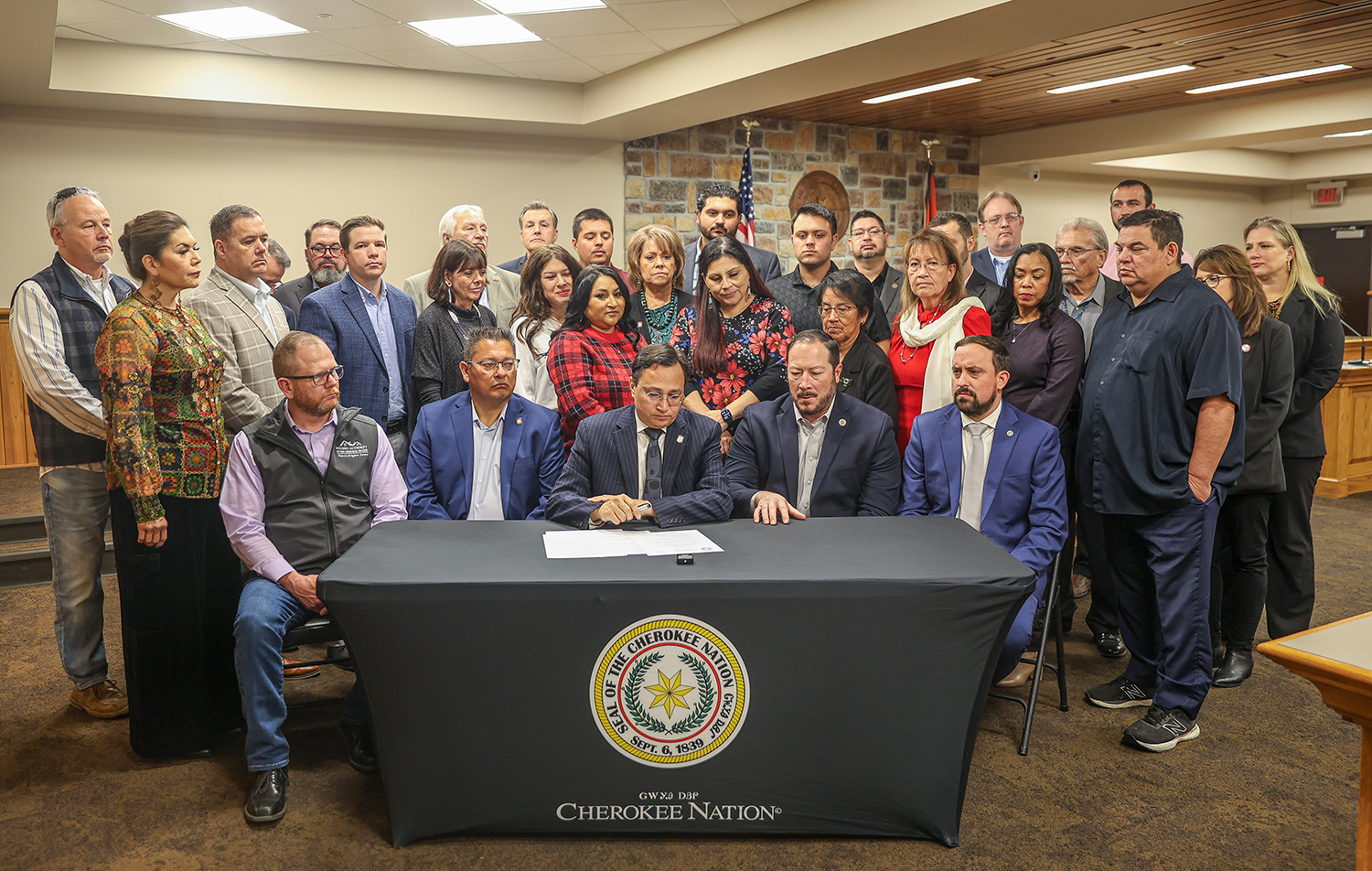TAHLEQUAH, Okla. — Cherokee Nation Principal Chief Chuck Hoskin Jr. and Deputy Chief Bryan Warner announced a new task force to examine criminal sentencing reform, enhance the tribe’s existing “reentry” program and evaluate detention facility needs.
“Since we seized opportunities to assert tribal sovereignty under the historic McGirt decision, our goal has not been to merely build up our criminal justice system, but to build the best possible criminal justice system,” Chief Hoskin said. “The Cherokee people and the larger public deserve a system that protects victims but also ensure that criminal sentencing can, where possible, lead to paths of reform, redemption and hope for the offender.”
Chief Hoskin and Deputy Chief Warner have set a quick deadline of February 1, 2024, for the task force to look at sentencing reform and enhancing the existing reentry program. The directive gives the task force through June 1 to examine detention facility needs.
“Asserting tribal sovereignty comes with great responsibility,” said Deputy Chief Warner. “We cannot act responsibly if we fail to give these important matters of criminal justice careful study.”
Since the United States Supreme Court reaffirmed the existence of tribal reservations in the McGirt decision, specifically applying to Cherokee Nation and other tribes in subsequent cases, Cherokee Nation has dramatically scaled up its criminal justice system.
Since the ruling, the Cherokee Nation has filed 10.319 felony or misdemeanor cases in Cherokee Nation District Court. Cherokee Nation has also met detention facility needs through 16 agreements with various state and county facilities.
Overall, Cherokee Nation has increased its post-McGirt criminal justice system by 380 percent.
Although current federal law restricts the lengths of sentences tribes can impose, tribes with criminal justice authority can impose years-long prison sentencing for a range of crimes.
Cherokee Nation has also operated a reentry program since 2014 to assist Cherokee Nation citizens within its reservation to navigate the challenge of becoming stable and productive in areas of life such as housing, health care and employment.
Cherokee Nation exercises exclusive tribal jurisdiction across its 7,000 square mile reservation. It works with state, local and federal law enforcement officials and prosecutors on a range of criminal case issues ranging from investigations, prosecutions, cross-deputization agreements and detention.
In addition to working with the region’s various law enforcement agencies and dramatically increasing its own criminal justice budget, Cherokee Nation made a total of over $13 million in grants available to every county and local first responder agency across its reservation in 2023.
Council of the Cherokee Nation Speaker Mike Shambaugh praised the creation of the task force as a “great next step.”
“Our top priority must always be meeting our obligation to enforce the law and protect victims, but we must also ensure that every offender who can move forward with their lives has a path forward after paying their debt to society,” Speaker Shambaugh said.
Speaker Shambaugh will serve on the Task Force, and he appointed Councilor Daryl Legg to a second seat on the task force reserved for Council members.
“These issues are a passion of mine and are certainly very personal to me, but they also impact all of our citizens,” Councilor Legg said. “We need to have open and honest dialogue about these subjects, make good recommendations and put those recommendations into law and policy at the Cherokee Nation.”
Cherokee Nation Attorney General Chad Harsha will chair the nine-member task force, which will include a number of other executive branch officials, and by invitation, District Judge Luke Barteaux was appointed by Cherokee Nation Chief Justice John Garrett.
The entire Task Force is as follows:
- Attorney General Chad Harsha, (chair)
- Attorney General’s designee (co-chair)
- Marshal Shannon Buhl (member)
- Secretary of State Shella Bowlin (member)
- Todd Hembree, CNB Vice President, Legal Department, Former Cherokee Nation Attorney General (member)
- Cherokee Nation District Judge Luke Barteaux
- Cherokee Nation Council Speaker Mike Shambaugh
- Cherokee Nation Council Member Daryl Legg
The Task Force, established by Chief Hoskin’s executive order will engage internal and external subject matter experts for feedback. The Task Force will issue public reports at the conclusion of its work.
“I’m confident we can create a set of recommendations that can help Chief Hoskin, Deputy Chief Warner and the Council of the Cherokee Nation craft legislation, policy and budget solutions in the interest of justice,” said Attorney General Harsha.
“We must all remember that these subjects, and many other issues within our criminal justice system, will require continual thought and attention even after the task force completes its work,” Chief Hoskin said.

